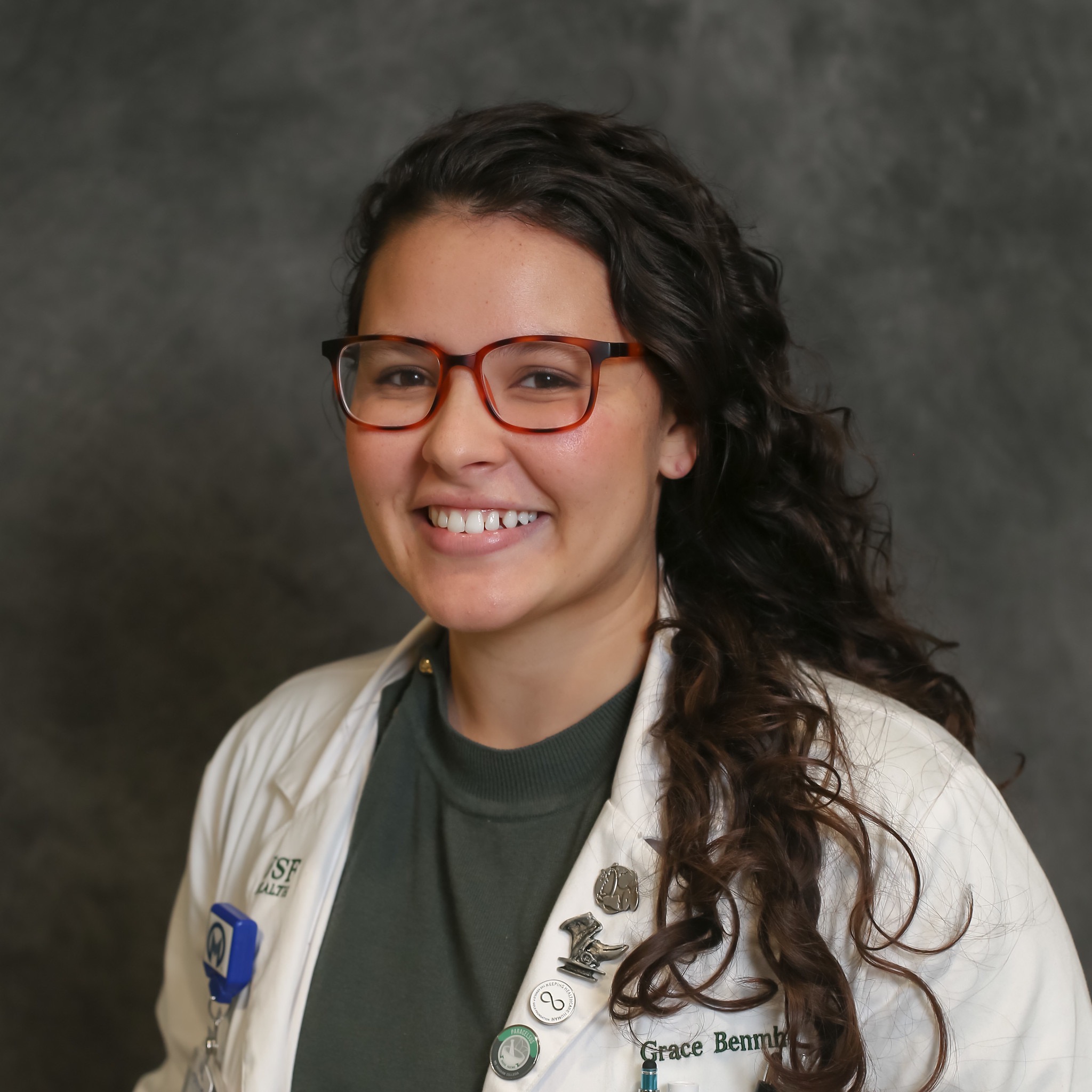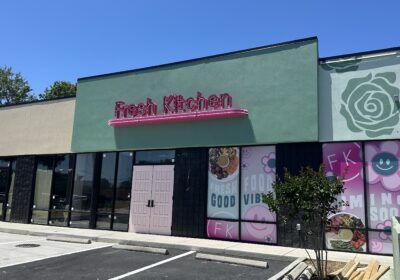Taking the lead: Grace Laila Benmhend finds hope and healing through hardships

This story is part of a continuing series that features women leaders at USF during Women’s History Month.
Grace Laila Benmhend’s first experience abroad was when she was only 6 months old and traveled to Morocco to visit her relatives. Traveling and being exposed to diverse cultures across the globe sparked a drive to serve on an international scale.
While seeing the world with her family, Benmhend discovered her love for medicine in the most unexpected way. She made several visits to hospitals in different countries due to severe food allergies, which showed her how other health care systems operated and convinced her to pursue a career within the medical field.
“I definitely saw a lot of disparities in health care and also just what different countries did best, and it really sparked this interest in passion in medicine for my own medical issues that made me want to enter medicine with a focus on international work.”
With an interest in international medicine, Benmhend, a third-year medical student at the Morsani College of Medicine, said she aspires to one day wear the white coat and work as a physician while focusing on family medicine.
“I really want to focus on prevention of most disease and illness, continuity of care and establishing close bonds with my patients because I feel that these close relationships typically help improve health in a way that many other specialties might not be able to as much,” Benmhend said.
Her passion for family medicine was one that hit close to home, especially when her aunt Cheryl was diagnosed with lymphoma, a disease she battled for more than a decade until she passed away in August.
Throughout her aunt’s treatment, Benmhend was present at some of her appointments and hospital visits. Having a close bond, she said her aunt would often talk about her own experiences and interactions with doctors, including the difference in treatments from each doctor as well as those that left a positive mark during such challenging times.
Those conversations, documented in a small journal she keeps close to her heart to this day, sparked a drive to make a positive impact within the field of medicine.
“She was very open with me about what made a good physician and told me ‘Grace, when you become a doctor, just remember do not ever do this’ or ‘remember to always do this’ so I would write everything down and I still have all that, so that I can always remember her experiences and make sure to never be a doctor that would disappoint her.”
Among their conversations, Benmhend said her aunt described physicians who were considerate of her preferences for a more natural healing approach as well as those who acknowledged and validated her concerns.
“The ones that really made a difference in her journey were physicians who just took the time to listen to [her],” Benmhend said. “A lot of them would even sit there and cry with her and put their hand on her knee, and just to be quiet and acknowledge her feelings and genuinely show compassion.”
Based on her aunt’s experiences and stories, she decided to pursue family medicine to focus on the prevention of diseases while establishing close bonds with her patients.
“I feel that these close relationships typically help improve health in a way that many other specialties might not be able to as much,” Benmhend said.
“I really love family medicine, and this year has definitely proven that to me as I rotated through different specialties … but [I] definitely felt very at home when I was with family medicine.”
Community service is one of Benmhend’s core values, one that drives her toward working on her medical degree and building her career in the field which led to her involvement and passion in outreach services and opportunities to serve her community, especially those who are underrepresented the most.
“I realized one of my biggest passions is working with refugees,” Benmhend said. “My stepmom is Lebanese and so I grew up with a lot of her friends and family who either came from Syria or Palestine [and] I kind of learned a lot about refugee issues through them. So it’s always a population that I wanted to work with.”
Her interest in international medicine and her own multicultural roots led Benmhend to help develop a free refugee clinic in Tampa, in February 2020. She first thought of the idea after attending a family medicine conference, where she watched a panel of physicians focused on international medicine.
After realizing there was a lack of free medical clinics focusing on the refugee demographic, Benmhend attended a refugee task force meeting to find ways she could volunteer in a medical setting for refugees.
“There was clearly a need for free medical care for the [refugee] population [and] that there’s no one providing it and from there, I was fortunate enough to just kind of be put in touch with all the right people and [the clinic] just took off from there,” she said.
“Fortunately, the faculty were just so supportive of the idea and they really started to take the reins and make it happen and we got other medical students involved.”
Benmhend approached Lynette Menezes, assistant vice president for international affairs at USF Health, who is also an advisory board member of the Gulf Coast Jewish Family and Community Services, a nonprofit helping refugees to resettle, with the idea to open a free refugee clinic as part of the capstone project required for graduation in fall 2019. After thorough training, meetings and recruiting students to take part in the project, the clinic officially opened its doors in February 2020.
While the operations were slightly affected by the surge of coronavirus cases across the state a month in, Benmhend said the clinic has only gotten more efficient since the first patient walked through the doors.
Led by medical students and physicians on a volunteer basis, the clinic is only open on the last Wednesday of every month and provides free medical care, including free preventive care and mental health services, to refugee patients in the Tampa Bay area. The clinic is also a part of Tampa Bay Street Medicine, a student organization focused on outreach services in local shelters, including free clinics, across the community.
“We found a site for the clinic and we kept working with other refugees service providers so that we can figure out ways to get patients and to make sure that these are actually refugees and not just any patient coming in.”
The clinic cares for an average of four to five patients per month, according to Benmhend. The majority of patients, she said, are from Syria, Iraq, Venezuela, Cuba and the Democratic Republic of Congo.
However, it does not advertise the times and locations for appointments until it confirms a patient’s refugee or asylum-seeker status, according to Benmhend. Patients need to contact one of the refugee service providers the clinic works with such as Radiant Hands and Lutheran Services Florida to seek an appointment.
Benmhend said the clinic then receives the referrals from Radiant Hands and Lutheran Services Florida to confirm their refugee or asylum as well as insurance status before scheduling an appointment.
For Benmhend, the clinic is crucial to providing refugees access to affordable health care options.
“Refugees really need free medical care at this time because they’re typically, on entry to this country, only given a maximum of eight months of Medicaid before they’re expected to find a job with full benefits. A lot of them are in pretty dire need of free medical care,” Benmhend said.
“It’s a relief for so many of [the patients] to go into a place where they’re receiving high-level care from amazing physicians and they’re getting to work with medical students beforehand, which also means that they get a lot more time one-on-one than they would have gotten if they had just gone to a regular doctor’s office.
“Medical students will typically only see one or two patients in an evening and they can take a long time with the patient and be very thorough [and] establish a close relationship with [the patients],” she said.
Menezes said Benmhend’s perseverance and commitment were crucial to helping develop the clinic once it first started.
“It’s her dedication and commitment to the project because she never gave up,” Menezes said. “Despite [the pandemic], she went above [and beyond] and continued with the project and never stopped. And I think that’s what embodies most of our students who are involved in these organizations and Grace is one of them, who shows this spirit of commitment despite the adversity of the pandemic.”
Just six months after the clinic opened and at about the same time Benmhend’s started her third year in medical school, her aunt passed away, a period she recalled as a “roller coaster.”
“To experience that just a few weeks into [my third year] set a precedent for the whole year of just a lot of anxiety and bouts of depression and struggling and it still has been very difficult,” she said. “I’ve learned a lot and it forced me to focus on myself and my own mental health.”
The support she received from close family members, including her fiance Bradley Mosher, was crucial during that time period, according to Benmhend.
“I’m grateful for everything, and fortunately I have a huge community of friends and family and [an] amazing fiance,” she said.
Amid the hardships Benmhend faced when her aunt passed away, Mosher said she battled through that stage with strength and endurance.
“I don’t know how she did it honestly. It was very admirable how she went through it,” he said.
“She didn’t lose focus on school, she’s still doing great with medical school. She didn’t lose focus with the refugee clinic she started, she’s still doing great with that. But obviously, she’s still distraught and working through losing her aunt who she was really close with, so the fact that she’s been able to continue to school and be successful … it’s very admirable.”
Based on the success of the clinic in providing free care to patients, Benmhend said the team is working on expanding and spreading more awareness about the clinic to attract new patients.
“We’re working on expanding and getting more patients to be aware of the clinic, and … even though it’s been a year, we’re still relatively new, so a lot of people just don’t know about it,” Benmhend said. “So we’re still spreading awareness of it, and making sure patients understand everything that we can offer.”
Benmhend hopes to continue working with refugees in the future, as she plans to work for Doctors Without Borders. She said the passion for traveling her family instilled within her played a significant role when building her foundation within the medical field.
“I’ve always wanted to do Doctors Without Borders one day and then even consider refugee health care part of international medicine,” she said. “I’m really grateful my family made it very clear how important traveling is, as a young kid and a teenager and now as an adult, it brought the family so close together [and] gave me incredible experiences that made me feel unique.
“[I’m] incredibly grateful for that and I definitely can’t overstate the benefits of traveling and experiencing something outside of your little bubble.”






